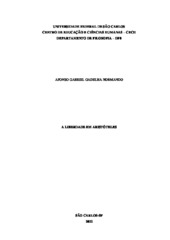A liberdade em Aristóteles
Resumo
Several scholars have entertained the notion of freedom in Aristotle according to their respective aims and methods. Although their research may overlap in some aspects, they are significantly far from reaching any dialogue for discussion. Far from seeking a solution to this problem, the present study aims to analyze and consider the most common aspects of the freedoms in Aristotle and, thus, elaborate on its own specificity. It is primarily intended to investigate the Aristotelian concept of freedom and its relation to reason. Freedom firstly appears in the relations of the members of a household: The free should be governed as free people and the slave should be governed despotically. It is later found that what qualities underline these differences are some aspects of the human soul: The man has a complete deliberative faculty; the woman has it, but it is without authority; the child also has it, but it is incomplete; and the slave does not have it at all. If the freeman is the one who should rule for he has the faculty of deliberation, then, in order to define him, it is necessary to analyze the elements of the soul which make him the ideal ruler. The rational soul allows the freeman to calculate and to have a sense of time. Moreover, he is the only one who is able to deliberate, to decide and to have rational desires. His natural capacities allow him to act in a contingent world not as a slave, but as a freeman: Reason is his guide, not chance. Similarly, in politics, the true Aristotelian freeman should not act as he likes, as it is commonly done in extreme democracies, he should rather act according to the law.
Collections
Os arquivos de licença a seguir estão associados a este item:

